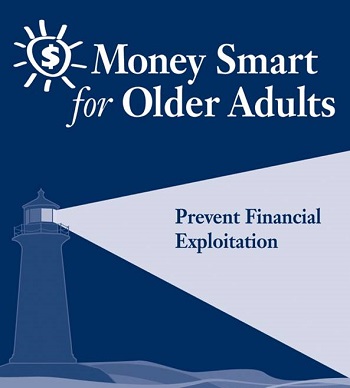This is not an April Fool’s joke! April is Financial Literacy Month as well as that time of year that we think of (shudder) paying taxes! Speaking of taxes, IRS has put out a list of 2015 scams of which you need to be aware. Among them are phone, phishing, and identify theft. You may also be interested in VisionAware’s tax guide.
AFB’s Partnership with the Consumer Financial Protection Bureau
To help consumers, family members, and professionals in the field, the U.S. Consumer Financial Protection Bureau (CFPB) has partnered with the AFB eLearning Center to provide a free webinar on tools you can use to protect yourself from financial fraud. Their tools include information and help for consumers and professionals. Below are a few of the tools and services they offer, but be sure to listen to this free, archived webinar. A transcript and accessible slide show accompany it. You will need to sign up to take the webinar, but there is no fee. Note: You can sign up as a guest to avoid using a credit card.
Office for Older Americans
This office helps consumers aged 62 and older get the financial education and training they need, basically for two purposes:
- First, to prevent unfair, deceptive, and abusive practices aimed at seniors such as financial exploitation and scams and
- Second, to help seniors make sound financial decisions as they age

One of the products that this office offers in conjunction with the Federal Deposit Insurance Corporation (FDIC) is a guide entitled: “Money Smart for Older Adults.” The guide is offered to consumers and as a training program as well for providers of senior services. It is also available in Spanish. There are seven segments:
- Common Types of Elder Financial Exploitation
- Scams Targeting Veterans
- Identity Theft
- Medical Identity Theft
- Scams that Target Homeowners
- Planning for Unexpected Life Events
- How to Be Financially Prepared for Disasters
Another important initiative of this office is the creation of a set of four, user-friendly, how-to guides for fiduciaries (people named to manage money or property for someone else). There are four types with a separate guide for each: agents under powers of attorney; court-appointed guardians of property; trustees under what we call revocable living trusts; and then government fiduciaries—and those would include Social Security representative payees and VA fiduciaries.
Office of Financial Empowerment
The Bureau’s Office of Financial Empowerment has a toolkit “Your Money, Your Goals”, that contains financial education modules and tools that are specifically geared to meet the needs of low-income and underserved populations. It is primarily to train social services workers and others who work directly with low-income and economically vulnerable consumers.
Consumer Complaints
CFPB has built a very robust set of resources and tools that are available at their website. There you can check out their computer complaint database, and Ask CFPB. You can also Tell Your Story, which is a way to help CFPB spot issues in the financial markets, illustrate challenges people are having, uncover insights into the products and services you depend on, and identify and fix problems before they become major issues.
Another great service is the ability to submit a consumer complaint online, or by calling 855-411-2372. When complaints come in CFPB checks them for completeness and confirm whether or not it’s within our jurisdiction.
Companies have 15 days to provide a substantive response to CFPB. We’re expected to close all but the most complicated complaints within 60 days. When that initial response is received from the company, consumers can then provide feedback about the company’s response and either accept it or dispute it.
Again, here is the information for signing up for the webinar.
Have you been the victim fraud? Comment below.
Additional Resources
Dealing with Identify Theft. This is a three-part series.